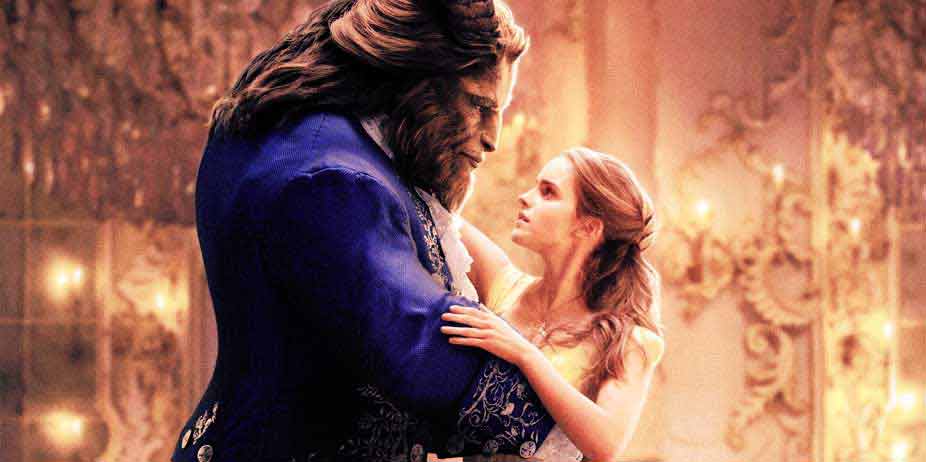 Beauty
& the Beast (2017)
Beauty
& the Beast (2017)
Beauty & the Beast is the only Disney animated film to have the distinction of a Best Picture nomination, before the Oscars created a special category for animated films. One of the most beloved films of all time, it's a difficult success story to recreate for live-action; this adaptation introduces new elements, expands on the old, and brings a richer depth to the story many of us grew up with.
Once upon a time, a spoiled prince (Dan Stevens) lived only for his own gratification; he taxed the people of his kingdom, in order to live a careless existence, filling his castle with the most beautiful objects. And then one day, in the midst of a great party, an old, ugly traveler (Hattie Moran) came to the castle, and offered him a single rose in exchange for shelter. The prince spurned her... and she turned into a beautiful enchantress, who placed upon the castle and its occupants a curse: that if he could not find love before the last rose petal fell, he should remain a beast for an eternity.
Many years later, Belle (Emma Watson) longs for more than her provincial life; pursued by the village hero, a champion of the former war, Gaston (Luke Evans), but more interested in inventing and reading books of far away places, Belle desires more than a quiet life, among people who do not understand her. Her music box making father (Kevin Kline) sets out to the neighboring town to deliver his latest inventions... but a snowstorm in the midst of June forces him into an unknown forest, where wolves drive him into an enchanted castle. His desire to take a rose home to his daughter, her one yearly request, enrages the Beast, who imprisons him in the tower... forcing Belle into a decision that will change her life, forever.
Much about this production improves on the original; problems with the timeline are resolved, and the characters are given richer histories; but even more poignant are the subtle messages throughout of "doing nothing" to prevent evil; in one powerful conversation, Belle asks Mrs. Potts (Emma Thompson) why everyone in the castle lives beneath a curse, since none of them "have done anything wrong" and Mrs. Potts replied that indeed, they did nothing while the Beast's father turned him from a gentle child into a terrible tyrant. This theme is reflected in LeFou (Josh Gad), who supports Gaston's evil deeds without hesitation, until he realizes the truth of his "hero"; in a sense, it becomes a story of the wages of sin, of atonement, and self-sacrifice, reprising the older themes of beauty being only skin deep, and Belle representing a Christ-figure, whose redemptive love restores the Beast to a greater, higher version of himself.
The costume and production design are exquisite; the prolog in which the prince meets the enchantress is an overwhelming sensuous feast for the eyes, and the film has a rich tapestry of gorgeous settings and design, which means the rather stiff animated furniture seems a little awkward and out of place. Some of the more massive sequences feel claustrophobic as a result, but the screenwriting decisions, and several new songs, give the story a greater pull than before; Gaston is even more of a villain, a psychopath desiring to relive his former war glories. Belle has become more of a feminist, determined to control her own fate... and the ending is even more heart-wrenching. Even LeFou comes around to the realization that his friend isn't much of a friend at all.
I felt the vocal talents were more underplayed than the original (it's hard to recreate the passion of the first cast) and wasn't entirely convinced of the animated aspect, but most of the changes improve and expand the story, and the moral undercurrent and powerful lessons involved make it a worthy way to spend an evening. Indeed, I think the opening and closing sequences, along with their exquisite Georgian garments, are some of my favorite Disney moments.
Sexual Content:
LeFou's interest in Gaston resembles a crush; he winds up
dancing with another man (briefly) at the end. The wardrobe dresses three
musketeers in female clothes; two are repulsed, the first grins and flounces
away. Gaston is a womanizer, who smirks at the idea of "war widows" and flirts
shamelessly with women.
Language:
Several uses of "damned" in its appropriate context ("you
could have damned us all").
Violence:
Gaston shoots the Beast several times, before falling to his
death; he ties up Maurice and leaves him to the wolves; wolves attack people in
several frightening scenes. Villagers attack the castle, which defends itself
(slapstick comedy).
Other:
None.
